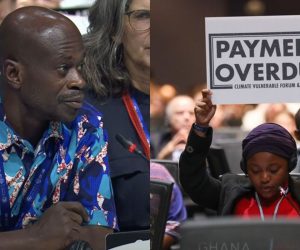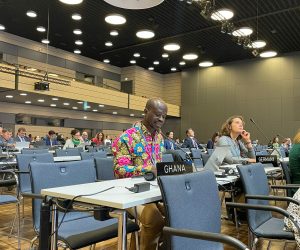
SPECIAL ENVOY
Abul Kalam Azad
Statement for Press Conference at UNFCCC COP26
10 November 2021 at 6.30 pm
Good evening and thank you.
I am pleased to speak for the CVF Presidency of the Bangladesh Government. The CVF Chair is Her Excellency Sheikh Hasina, the Honorable Prime Minister of Bangladesh.
CVF is 55 climate threatened nations around the world representing 1.4 billion people.
I really welcome – and the CVF very much welcomes – this opportunity to stand side by side with civil society groups for an ambitious outcome to COP26.
We really appreciate the support of civil society for our key calls on COP26: for an Emergency Pact to be made here in Glasgow.
I want to thank my fellow panelists and all the organizations that are standing by the most vulnerable nations here.
I would also like to provide an update on our views on the progress at COP26:
Glasgow needs to deliver an “Emergency Pact” to restore confidence in international climate cooperation for keeping 1.5C alive, to accelerate adaptation, address mounting loss and damage, and ensure promised finance is delivered.
The Paris regime needs to get back on track especially on ambition and finance. Glasgow is our chance.
This is a global justice issue because the poorest and most vulnerable are by far hardest hit yet also least responsible and least well positioned to respond to the crisis. We need the world to respond here at COP26.
We welcome the latest CMA main text on revising NDCs to align with 1.5 by next year and especially on annual 2030 ambition roundtables or platforms, as we called for in our Dhaka-Glasgow CVF Declaration.
That said, we would stress that this must be at leaders’ level and not ministerial because the purpose is to have political commitments to more ambition. Such commitments need to come from leaders who should be asking themselves each year what more can be done to deal with the global climate crisis.
Likewise, this cannot be an open-ended process: For 2030 targets to be changed, this should happen earliest as possible, and cannot credibly be accomplished after 2025. There would not be time to enact implementation policies for 2030 after that.
Therefore, we really insist that these annual ambition raising platforms should run only from 2022 to 2025. We need to raise ambition with huge urgency in the near-term.
Finally, we need to bring it to the attention that our nations are burning on the frontlines of a planet on fire. Once more: IPCC now says the 1.5 world happens in 2030. Therefore, we must also constantly strengthen adaptation ambition to keep pace with this climate emergency. So, the annual platforms need to encompass adaptation also, and not only mitigation.
The current texts on finance need much strengthening in the coming days.
There are no excuses for the $100 billion climate finance to not be met already in 2022, given the missing of this goal so far.
Delivery over the whole period 2020-24 must be assured, which means $500 billion in balanced climate finance mobilized over this period. This is even a “low bar” given how big are the actual financing needs for climate action of developing countries.
Furthermore, we are calling for independent annual monitoring of the implementation of finance delivery, which also needs to be reflected in the outcome here. This will help strengthen confidence that finance is flowing.
On the other hand: we welcome the CMA section on adaptation finance. We welcome the language for developed country Parties to at least double their collective provision of climate finance for adaptation. Scaling up adaptation finance to the promised balanced levels is a humanitarian urgency at this point.
Finally, I would like to reiterate that the COP needs to take practical steps to explore concrete financing options for loss and damage since it is not part of the $100 billion support.
The absence of strong enough adaptation and mitigation action means vulnerable communities mainly suffer loss and damage. Without financial support little can be done to minimize damaging effects for vulnerable communities around the world.
We, therefore, are asking this COP to mandate the studying of financing options for loss and damage that could then be presented for consideration at COP27 next year.
Likewise, this COP needs to ensure that, from COP27 onwards, loss and damage be made a standing item at every COP, as it is a standalone and truly vital article of the Paris agreement.
I again thank our civil society partners today and the members of the press for their attention.
We need this Emergency Pact for climate justice to be done at Glasgow.
We need to act to leave this world better than we got it.
I thank you.



